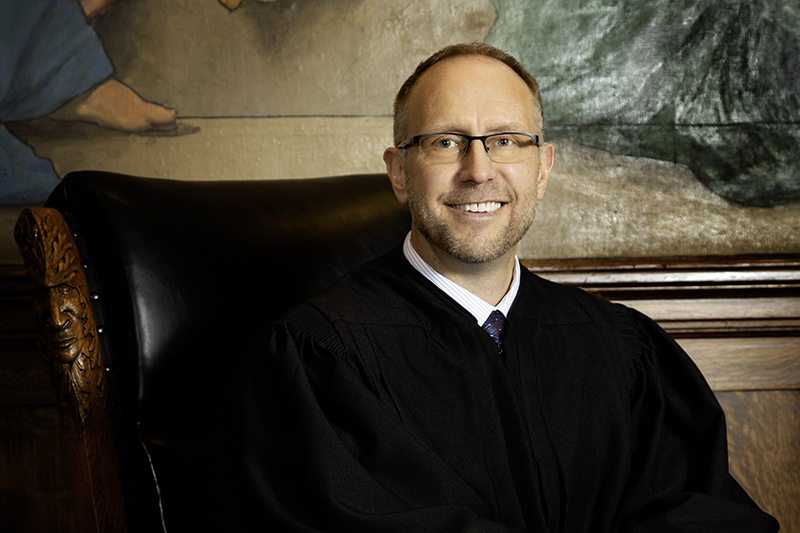Judge Blocks Rule Forcibly “Outing” Transgender Police Officers
Plaintiffs argue that gender-identity reporting requirement violates police officers' right to privacy and places them at risk of retaliation

A judge has temporarily blocked a new California state rule that requires police officers to share their gender identities when reporting traffic stops.
Sacramento County Superior Court Judge Christopher Krueger issued the temporary injunction blocking the rule, which was adopted by California Attorney General Rob Bonta to comply with the Racial and Identity Profiling Act.
Under the 2015 law, police officers and law enforcement agencies must report data to the state on the “perceived demographic and other detailed data regarding pedestrian and traffic stops” to identify patterns that may indicate a bias against particular identity groups.
That information is sent to a 19-member board consisting of advocates, spiritual leaders, academics, attorneys, and members of law enforcement.
The board is expected to analyze the stop data, as well as any civilian complaint data regarding officers’ behavior, on an annual basis, review law enforcement training focused on eliminating bias, and make policy recommendations for developing more effective training.
Bonta’s office subsequently proposed and adopted a rule, which took effect on January 1, 2024, that requires police officers to fill out a specific form for compiling the data on the perceived demographics of people officers stop.
As part of completing the form, officers must disclose their gender identities, reports the Los Angeles Daily Journal.
Several organizations representing law enforcement officers, including the Peace Officers Research Association of California (PORAC) and the California Association of Highway Patrolmen, sued over the law, arguing, in part, that it violates officers’ constitutional right to privacy.
They note that the information provided to the state is accessible by other law enforcement officials, which could lead transgender or nonbinary officers to be “outed” against their will.
“This regulation violates not only violates employee civil rights, but places employers in the untenable position of choosing between incompatible laws,” lawyers representing the groups wrote in their lawsuit.
Judge Krueger found that the plaintiffs have no “plain, speedy or adequate remedy” if the rule is enforced against them, necessitating an injunction. He scheduled a follow-up hearing in the case for March 19.
PORAC told the San Francisco Chronicle that, under the rule, any officer who does not disclose their gender identity could be fired and could lose their license.
As a result, the organization — which represents more than 78,000 members from 955 law enforcement agencies throughout California — argues that transgender and nonbinary people will refrain from applying to work as police officers out of fear of being outed against their will.
Being known as LGBTQ can be tenuous for law enforcement officers, especially those forcibly outed, due to the militaristic structure of law enforcement agencies and the typically socially conservative bent of many rank-and-file officers.
“PORAC remains committed to protecting the rights of all our members to live as they wish, identify as they see fit, and to share that identity on their own terms,” the organization’s president, Brian Marvel, who is named as the lead plaintiff in the case, said in a statement. “It is not fair or right to put officers in the untenable position of disclosing their gender identity before they are ready to do so and as a condition of employment.”
David Mastagn, one of the lawyers representing the plaintiffs, told the Chronicle that Bonta has taken a contradictory stance when it comes to “forced outing” policies adopted by some conservative-leaning school boards as part of a desire to restrict LGBTQ visibility and appeal to “parental rights” advocates.
Bonta has challenged such policies in court, arguing that such policies violate transgender students’ equal rights, right to privacy, and right to live freely from discrimination.
In a “legal alert” to school officials in California on January 11, Bonta doubled down on this stance, asserting that “forced gender identity disclosure policies — which target transgender and gender nonconforming students by mandating that school personnel disclose a student’s gender identity or gender nonconformity to a parent or guardian without the student’s express consent — violate state law.”
Mastagni noted that, “paradoxically,” Bonta’s Department of Justice refuses to afford officers the same privacy beliefs to which he claims minors are entitled.
Bonta has yet to respond to that criticism publicly. A spokesperson for the attorney general’s office was not immediately available for comment.
Support Metro Weekly’s Journalism
These are challenging times for news organizations. And yet it’s crucial we stay active and provide vital resources and information to both our local readers and the world. So won’t you please take a moment and consider supporting Metro Weekly with a membership? For as little as $5 a month, you can help ensure Metro Weekly magazine and MetroWeekly.com remain free, viable resources as we provide the best, most diverse, culturally-resonant LGBTQ coverage in both the D.C. region and around the world. Memberships come with exclusive perks and discounts, your own personal digital delivery of each week’s magazine (and an archive), access to our Member's Lounge when it launches this fall, and exclusive members-only items like Metro Weekly Membership Mugs and Tote Bags! Check out all our membership levels here and please join us today!


























You must be logged in to post a comment.